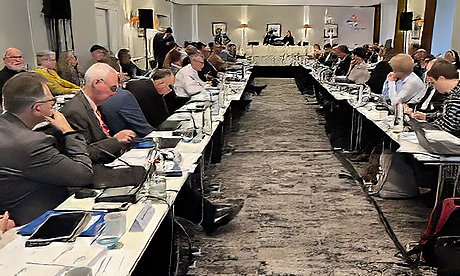Despite Vatican disapproval, an important synodal way meeting in Germany took place on 10 November. It was the first meeting programmed to implement the country’s synodal way decisions.
The meeting was light on bishops though. Eight of Germany’s 27 diocesan bishops were marked absent.
Four chose to boycott the meeting: Cologne’s Cardinal Rainer Maria Woelki, Eichstätt’s Bishop Gregor Maria Hanke, Passau’s Bishop Stefan Oster, and Regenburg’s Bishop Rudolf Voderholzer.
They signaled their intention in June when they vetoed plans for the committee to be paid for using a fund which Germany’s diocesan bishops control.
Four others had engagements elsewhere.
The synodal way
Germany’s synodal way meetings ended formally in March.
Its committee intended a permanent “synodal council” of 74 bishops and lay people to be established in 2026.
However Rome objected to synodal council plans back in January.
It would undermine the role of bishops, according to the Second Vatican Council teachings.
No bishop was obliged to take part in the committee’s deliberations, the Vatican said.
Meeting went ahead
The inaugural synodal committee meeting was “scheduled deliberately” to follow the synod on synodality’s first Vatican session.
President of the German bishops’ conference, Bishop Georg Bätzing and most other invitees attended the planned meeting.
Addressing the four boycotters’ absence, Bätzing said: “We have known for a long time that even among us bishops our images of the Church and the future are very different. I want to expressly say that this is good.
“We have to fight for the future of the Church and the question of the right path has accompanied the Church since its beginnings; the letters from the New Testament are full of these disputes…”
The meeting expected to feature sensitive discussions about the body’s statutes and rules of procedure.
Debate was anticipated, focusing on whether synodal committee meetings should be open to the public like the synodal way’s plenary assemblies.
Discussion time was earmarked to decide whether the committee should continue insisting two-thirds of bishops must approve resolutions.
The Central Commission of German Catholics (ZdK) favours public meetings. It wants decisions to require only a two-thirds majority of all committee members.
Change needed
ZdK leader Irme Stetter-Karp alluded to the record numbers of German Catholics formally leaving the Church. Change needs to happen soon, she warned.
“Given the challenges we have also faced in recent months, I can only note with regret that in the eyes of those who are leaving the Church we are moving too slowly.”
Referring to Pope Francis’ 1 November motu proprio calling for a “paradigm shift” in theology, she said:
“We need the turning point that Pope Francis calls for … starting from theology for the entire Church…it is time to ‘interpret the present prophetically and seek new paths for the future.’ That’s what we’re here for.”
The four bishops’ decision to block funds for the synodal committee “shows how urgently we need changes in the decision-making structures” she commented.
Bätzing, who attended the Rome assembly, said: “There must be and can be different ways of structuring synodality at different levels and in different regions of the world.
“Different traditions and cultural differences lead to different forms of synodality. We can also learn from each other. And yet we must live and continue to search for a form of synodality that is suitable for us.”
Source
